- Home
- Octavia E. Butler
Parable of the Sower Page 20
Parable of the Sower Read online
Page 20
“She?” Travis asked right on cue. “Her?”
“Damn it, Harry,” I said. “We forgot to buy that tape for your mouth.”
He shook his head, then gave me an embarrassed smile. “I’ve known you all my life. It isn’t easy to remember to switch all your pronouns. I think it’s all right this time, though.”
“I told you so!” Natividad said to her husband. Then she looked embarrassed. “I told him you didn’t look like a man,” she said to me. “You’re tall and strong, but… I don’t know. You don’t have a man’s face.”
I had, almost, a man’s chest and hips, so maybe I should be glad to hear that I didn’t have a man’s face—though it wasn’t going to help me on the road. “We believed two men and a woman would be more likely to survive than two women and a man,” I said. “Out here, the trick is to avoid confrontation by looking strong.”
“The three of us aren’t going to help you look strong,” Travis said. He sounded bitter. Did he resent the baby and Natividad?
“You are our natural allies,” I said. “You sneered at that last time I said it, but it’s true. The baby won’t weaken us much, I hope, and he’ll have a better chance of surviving with five adults around him.”
“I can take care of my wife and my son,” Travis said with more pride than sense. I decided not to hear him.
“I think you and Natividad will strengthen us,” I said. “Two more pairs of eyes, two more pairs of hands. Do you have knives?”
“Yes.” He patted his pants pocket. “I wish we had guns like you.”
I wished we had guns—plural—too. But I didn’t say so. “You and Natividad look strong and healthy,” I said. “Predators will look at a group like the five of us and move on to easier prey.”
Travis grunted, still noncommittal. Well, I had helped him twice, and now I was a woman. It might take him a while to forgive me for that, no matter how grateful he was.
“I want to hear some of your poetry,” Natividad said. “The man we worked for, his wife used to write poetry. She would read it to me sometimes when she was feeling lonely. I liked it. Read me something of yours before it gets too dark.”
Odd to think of a rich woman reading to her maid—which was who Natividad had been. Maybe I had the wrong idea of rich women. But then, everyone gets lonely. I put my journal down and picked up my book of Earthseed verses. I chose soft, non-preachy verses, good for road-weary minds and bodies.
18
❏ ❏ ❏
Once or twice
each week
A Gathering of Earthseed
is a good and necessary thing.
It vents emotion, then
quiets the mind.
It focuses attention,
strengthens purpose, and
unifies people.
EARTHSEED: THE BOOKS OF THE LIVING
SUNDAY, AUGUST 8, 2027
“YOU BELIEVE IN ALL this Earthseed stuff, don’t you?” Travis asked me.
It was our day off, our day of rest. We had left the highway to find a beach where we could camp for the day and night and be comfortable. The Santa Barbara beach we had found included a partly burned park where there were trees and tables. It wasn’t crowded, and we could have a little daytime privacy. The water was only a short walk away. The two couples took turns disappearing while I watched their packs and the baby. Interesting that the Douglases were already comfortable trusting me with all that was precious to them. We didn’t trust them to watch alone last night or the night before, though we did make them watch. We had no walls to put our backs against last night so it was useful to have two watchers at a time. Natividad watched with me and Travis watched with Harry. Finally, Zahra watched alone.
I organized that, feeling that it was the schedule that would be most comfortable to both couples. Neither would be required to trust the other too much.
Now, amid the outdoor tables, firepits, pines, palms, and sycamores, trust seems not to be a problem. If you turn your back to the burned portion which is barren and ugly, this is a beautiful place, and it’s far enough from the highway not to be found by the ever-flowing river of people moving north. I found it because I had maps—in particular, a street map of much of Santa Barbara County. My grandparents’ maps helped us explore away from the highway even though many street signs were fallen or gone. There were enough left for us to find beaches when we were near them.
There were locals at this beach—people who had left real homes to spend an August day at the beach. I eavesdropped on a few fragments of conversation and found out that much.
Then I tired talking to some of them. To my surprise, most were willing to talk. Yes, the park was beautiful except where some painted fools had set fires. The rumors were that they did it to fight for the poor, to expose or destroy the goods hoarded by the rich. But a park by the sea wasn’t goods. It was open to everyone. Why burn it? No one knew why.
No one knew where the fad of painting yourself and getting high on drugs and fire had come from, either. Most people suspected it had begun in Los Angeles where, according to them, most stupid or wicked things began. Local prejudice. I didn’t tell any of them I was from the LA. area. I just smiled and asked about the local job situation. Some people said they knew where I could work to earn a meal or a “safe” place to sleep, but no one knew where I could earn money. That didn’t mean there weren’t any such jobs, but if there were, they would be hard to find and harder to qualify for. That’s going to be a problem wherever we go. And yet we know a lot, the three of us, the five of us. We know how to do a great many things. There must be a way to put it all together and make us something other than domestic servants working for room and board. We make an interesting unit.
Water is very expensive here—worse than in Los Angeles or Ventura Counties. We all went to a water station this morning. Still no freeway watersellers for us.
On the road yesterday, we saw three dead men—a group together, young, unmarked, but covered with the blood they had vomited, their bodies bloated and beginning to stink. We passed them, looked at them, took nothing from their bodies. Their packs—if they’d had any—were already gone. Their clothes, we did not want. And their canteens—all three still had canteens—their canteens, no one wanted.
We all resupplied yesterday at a local Hanning Joss. We were relieved and surprised to see it—a good dependable place where we could buy all we needed from solid food for the baby to soap to salves for skin chafed by salt water, sun, and walking. Natividad bought new liners for her baby carrier and washed and dried a plastic bag of filthy old ones. Zahra went with her into the separate laundry area of the store to wash and dry some of our filthy clothing. We wore our sea-washed clothing, salty, but not quite stinking. Paying to wash clothes was a luxury we could not often afford, yet none of us found it easy to be filthy. We weren’t used to it. We were all hoping for cheaper water in the north. I even bought a second clip for the gun—plus solvent, oil, and brushes to clean the gun. It had bothered me, not being able to clean it before. If the gun failed us when we needed it, we could be killed. The new clip was a comfort, too. It gave us a chance to reload fast and keep shooting.
Now we lounged in the shade of pines and sycamores, enjoyed the sea breeze, rested, and talked. I wrote, fleshing out my journal notes for the week. I was just finishing that when Travis sat down next to me and asked his question:
“You believe in all this Earthseed stuff, don’t you?”
“Every word,” I answered.
“But…you made it up.”
I reached down, picked up a small stone, and put it on the table between us. “If I could analyze this and tell you all that it was made of, would that mean I’d made up its contents?”
He didn’t do more than glance at the rock. He kept his eyes on me. “So what did you analyze to get Earthseed?”
“Other people,” I said, “myself, everything I could read, hear, see, all the history I could learn. My father is—was—a minister and a teach
er. My stepmother ran a neighborhood school. I had a chance to see a lot.”
“What did your father think of your idea of God?”
“He never knew.”
“You never had the guts to tell him.”
I shrugged. “He’s the one person in the world I worked hard not to hurt.”
“Dead?”
“Yes.”
“Yeah. My parents, too.” He shook his head. “People don’t live long these days.”
There was a period of silence. After a while, he said, “How did you get your ideas about God?”
“I was looking for God,” I said. “I wasn’t looking for mythology or mysticism or magic. I didn’t know whether there was a god to find, but I wanted to know. God would have to be a power that could not be defied by anyone or anything.”
“Change.”
“Change, yes,”
“But it’s not a god. It’s not a person or an intelligence or even a thing. It’s just… I don’t know. An idea.”
I smiled. Was that such a terrible criticism? “It’s a truth,” I said. “Change is ongoing. Everything changes in some way—size, position, composition, frequency, velocity, thinking, whatever. Every living thing, every bit of matter, all the energy in the universe changes in some way. I don’t claim that everything changes in every way, but everything changes in some way.”
Harry, coming in dripping from the sea, heard this last. “Sort of like saying God is the second law of thermodynamics,” he said, grinning. He and I had already had this conversation.
“That’s an aspect of God,” I said to Travis. “Do you know about the second law?”
He nodded. “Entropy, the idea that the natural flow of heat is from something hot to something cold—not the other way—so that the universe itself is cooling down, running down, dissipating its energy.”
I let my surprise show.
“My mother wrote for newspapers and magazines at first,” he said. “She taught me at home. Then my father died and she couldn’t earn enough for us to keep the house. And she couldn’t find any other work that paid money. She had to take a job as a live-in cook, but she went on teaching me.”
“She taught you about entropy?” Harry asked.
“She taught me to read and write,” Travis said. “Then she taught me to teach myself. The man she worked for had a library—a whole big room full of books.”
“He let you read them?” I asked.
“He didn’t let me near them.” Travis gave me a humorless smile. “I read them anyway. My mother would sneak them to me.”
Of course. Slaves did that two hundred years ago. They sneaked around and educated themselves as best they could, sometimes suffering whipping, sale, or mutilation for their efforts.
“Did he ever catch you or her at it?” I asked.
“No.” Travis turned to look toward the sea. “We were careful. It was important. She never borrowed more than one book at a time. I think his wife knew, but she was a decent woman. She never said anything. She was the one who talked him into letting me marry Natividad.”
The son of the cook marrying one of the maids. That was like something out of another era, too.
“Then my mother died and all Natividad and I had was each other, and then the baby. I was staying on as gardener-handyman, but then the old bastard we worked for decided he wanted Natividad. He would try to watch when she fed the baby Couldn’t let her alone. That’s why we left. That’s why his wife helped us leave. She gave us money. She knew it wasn’t Natividad’s fault. And I knew I didn’t want to have to kill the guy. So we left.”
In slavery when that happened, there was nothing the slaves could do about it—or nothing that wouldn’t get them killed, sold, or beaten.
I looked at Natividad who sat a short distance away, on spread out sleepsacks, playing with her baby and talking to Zahra. She had been lucky. Did she know? How many other people were less lucky—unable to escape the master’s attentions or gain the mistress’s sympathies. How far did masters and mistresses go these days toward putting less than submissive servants in their places?
“I still can’t see change or entropy as God,” Travis said, bringing the conversation back to Earthseed.
“Then show me a more pervasive power than change,” I said. “It isn’t just entropy. God is more complex than that. Human behavior alone should teach you that much. And there’s still more complexity when you’re dealing with several things at once—as you always are. There are all kinds of changes in the universe.”
He shook his head. “Maybe, but nobody’s going to worship them.”
“I hope not,” I said. “Earthseed deals with ongoing reality, not with supernatural authority figures. Worship is no good without action. With action, it’s only useful if it steadies you, focuses your efforts, eases your mind.”
He gave me an unhappy smile. “Praying makes people feel better even when there’s no action they can take,” he said. “I used to think that was all God was good for—to help people like my mother stand what they had to stand.”
“That isn’t what God is for, but there are times when that’s what prayer is for. And there are times when that’s what these verses are for. God is Change, and in the end, God prevails. But there’s hope in understanding the nature of God—not punishing or jealous, but infinitely malleable. There’s comfort in realizing that everyone and everything yields to God. There’s power in knowing that God can be focused, diverted, shaped by anyone at all. But there’s no power in having strength and brains, and yet waiting for God to fix things for you or take revenge for you. You know that. You knew it when you took your family and got the hell out of your boss’s house. God will shape us all every day of our lives. Best to understand that and return the effort: Shape God.”
“Amen!” Harry said, smiling.
I looked at him, wavered between annoyance and amusement, and let amusement win. “Put something on before you burn, Harry.”
“You sounded like you could use an ‘amen,’” he said as he put on a loose blue shirt. “Do you want to go on preaching or do you want to eat?”
We had beans cooked with bits of dried meat, tomatoes, peppers, and onions. It was Sunday. There were public firepits in the park, and we had plenty of time. We even had a little wheat-flour bread and the baby had real baby food with his milk instead of mashed or mother-chewed bits of whatever we were eating.
It’s been a good day. Every now and then, Travis would ask me another question or toss me another challenge to Earthseed, and I would try to answer without preaching him a sermon—which was hard. I think I managed it most of the time. Zahra and Natividad got into an argument about whether I was talking about a male god or a female god. When I pointed out that Change had no sex at all and wasn’t a person, they were confused, but not dismissive. Only Harry refused to take the discussion seriously. He liked the idea of keeping a journal, though. Yesterday he bought a small notebook, and now he’s writing, too—and helping Zahra with her reading and writing lessons.
I’d like to draw him into Earthseed. I’d like to draw them all in. They could be the beginning of an Earthseed community. I would love to teach Dominic Earthseed as he grows up. I would teach him and he would teach me. The questions little children ask drive you insane because they never stop. But they also make you think. For now, though, I had to deal with Travis’s questions.
I took a chance. I told Travis about the Destiny.
He had asked and asked me what the point of Earthseed is. Why personify change by calling it God? Since change is just an idea, why not call it that? Just say change is important.
“Because after a while, it won’t be important!” I told him. “People forget ideas. They’re more likely to remember God—especially when they’re scared or desperate.”
“Then they’re supposed to do what?” he demanded. “Read a poem?”
“Or remember a truth or a comfort or a reminder to action,” I said. “People do that all the time. They reach
back to the Bible, the Talmud, the Koran, or some other religious book that helps them deal with the frightening changes that happen in life.”
“Change does scare most people.”
“I know. God is frightening. Best to learn to cope.”
“Your stuff isn’t very comforting.”
“It is after a while. I’m still growing into it myself. God isn’t good or evil, doesn’t favor you or hate you, and yet God is better partnered than fought.”
“Your God doesn’t care about you at all,” Travis said.
“All the more reason to care about myself and others. All the more reason to create Earthseed communities and shape God together. ‘God is Trickster, Teacher, Chaos, Clay.’ We decide which aspect we embrace—and how to deal with the others.”
“Is that what you want to do? Set up Earthseed communities?”
“Yes.”
“And then what?”
There it was. The opening. I swallowed and turned a little so that I could see the burned over area. It was so damn ugly. Hard to think anyone had done that on purpose.
“And then what?” Travis insisted. “A God like yours wouldn’t have a heaven for people to hope for, so what is there?”
“Heaven,” I said, facing him again. “Oh, yes. Heaven.”
He didn’t say anything. He gave me one of his suspicious looks and waited.
“The Destiny of Earthseed is to take root among the stars,’” I said. “That’s the ultimate Earthseed aim, and the ultimate human change short of death. It’s a destiny we’d better pursue if we hope to be anything other than smooth-skinned dinosaurs—here today, gone tomorrow, our bones mixed with the bones and ashes of our cities, and so what?”
“Space?” he said. “Mars?”
“Beyond Mars,” I said. “Other star systems. Living worlds.”
“You’re crazy as hell,” he said, but I like the soft, quiet way he said it—with amazement rather than ridicule.

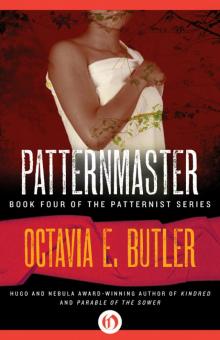 Patternmaster
Patternmaster Survivor
Survivor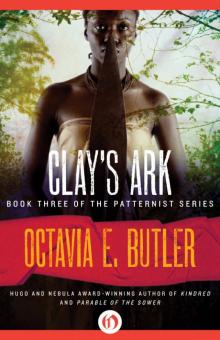 Clay's Ark
Clay's Ark Bloodchild and Other Stories
Bloodchild and Other Stories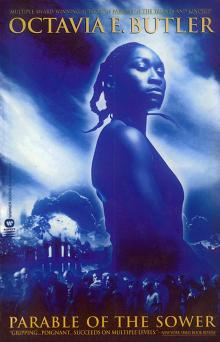 Parable of the Sower
Parable of the Sower Wild Seed
Wild Seed Fledgling
Fledgling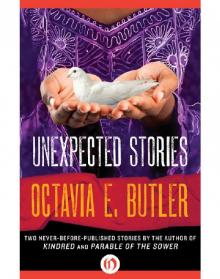 Unexpected Stories
Unexpected Stories Kindred
Kindred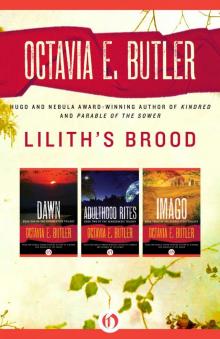 Lilith's Brood: Dawn / Adulthood Rites / Imago
Lilith's Brood: Dawn / Adulthood Rites / Imago Adulthood Rites
Adulthood Rites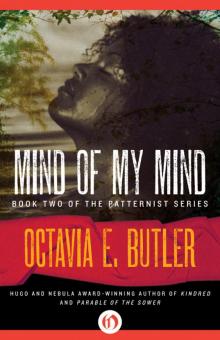 Mind of My Mind
Mind of My Mind Seed to Harvest
Seed to Harvest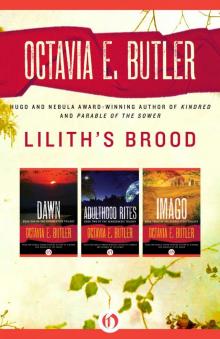 Lilith's Brood: Dawn, Adulthood Rites, and Imago (Xenogenesis Trilogy)
Lilith's Brood: Dawn, Adulthood Rites, and Imago (Xenogenesis Trilogy) Bloodchild
Bloodchild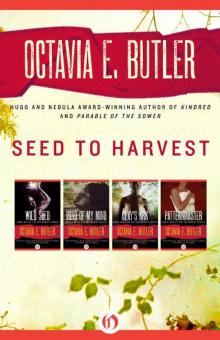 Seed to Harvest: Wild Seed, Mind of My Mind, Clay's Ark, and Patternmaster (Patternist)
Seed to Harvest: Wild Seed, Mind of My Mind, Clay's Ark, and Patternmaster (Patternist)